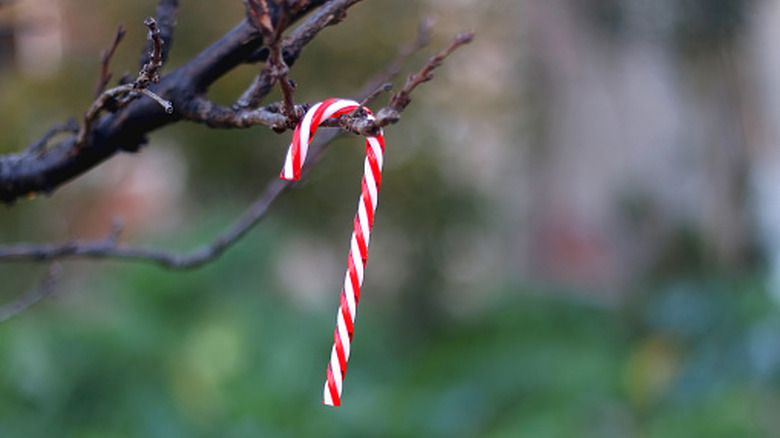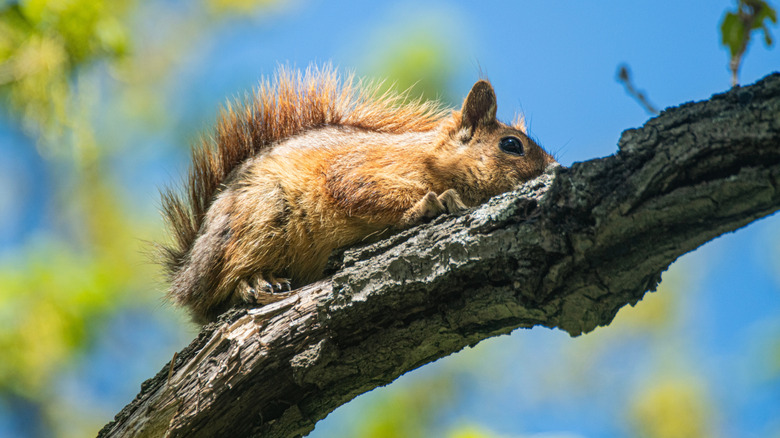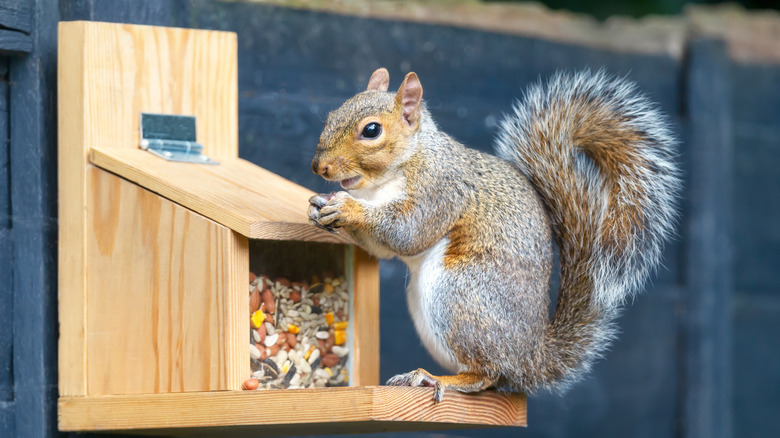Why Some People Swear By Candy Canes To Prevent Squirrels (And Whether It Actually Works)
Looking at the continued popularity of characters like Spongebob's Sandy Cheeks and Marvel's Doreen Green, it's clear that squirrels have a friendly cultural association among general audiences. However, homeowners and gardeners have a more conflicted relationship with the critters. Squirrels often chew through home infrastructure like wood sidings and attic vents, sometimes becoming an active pest by building their nests in the exterior walls and damaging your insulation or wiring. They sometimes damage trees by breaking off branches and stripping bark, and will dig up garden flowers or even attack bird feeders for food. With all of that in mind, it's no wonder people are often looking for ways to repel these rambunctious rodents. One popular method involves an unusual item: candy canes.
To be specific, the smell of ingredients like peppermint oil is considered a rodent repellent alongside castor oil, egg solids, garlic powder, and cinnamon. Candy canes offer a fun way to hang peppermint around your home, trees, and bird feeders — though it is likely better to outright remove these feeders and set them somewhere without tree access, as squirrelly guests should not be actively fed at risk of them becoming more aggressive when you stop. A number of repellents which include peppermint oil are recognized by services like Washington State University's Pesticide Information Center Online, but the question remains: are candy canes and peppermint smells an effective way to prevent squirrels? It's hard to say given the broad lack of studies, but official recommendations point to it being at least moderately effective.
Why candy canes and peppermint might be effective on squirrels
Commercially available chemical repellents like peppermint oil fall under a few broad categories: odor aversion, taste aversion, or fear inducement. Using candy canes in particular would fit best an odor aversion role, making an area smell bad to certain wildlife or masking the scent of food. However, most pest control works best as contact repellent, such as peppermint oil applied directly to whatever plants or objects need protecting. These scents would need to be reapplied regularly, especially after being washed off in the rain, and you may have to rotate between different products to get the best effect. Animals may learn to ignore a particular bad scent if no immediate dangers condition them to stay away more permanently.
You can make your own peppermint-based repellents in lieu of candy canes, giving you easy and toxic-free pest control methods to try in the garden. Mixing a few drops each of peppermint, thyme, and rosemary essential oil with water makes a spray solution that's great for keeping away aphids, mites, whiteflies, and a myriad of other garden pests. Even though the efficacy of materials like candy canes have not been actively tested on squirrels, peppermint oil is one of a few natural oils that work to keep wasps at bay, so it's worth keeping on-hand. Most repellents of this nature are going to be temporary solutions when it comes to pests like squirrels, so you'll want to invest in other means of protecting your garden.
Other means of keeping squirrels at bay
If you have a squirrel problem, one way to watch your garden more effectively is planting in smaller, more manageable patio containers. Physical barriers can also keep squirrels away from your bird feeder or garden beds. Try covering your garden bed with chicken wire that's secured to the ground with stakes. Installing cages around your crops or flowers is a high-effort means of pest control, but can more effectively cut off any entry points. If you believe in the power of candy canes, it should be easy to hang a few of them around each cage. It's also worth considering scare tactics like balloons patterned after hawk eyes, motion-sensitive sprinklers, or noise-makers.
Even if you manage to keep squirrels out of your garden with candy canes and peppermint oil, you'll also want to modify (but not destroy) their habitats to help protect your home from infestations. Trim any tree branches more than 6 feet away from the building, and install baffles or greased poles to keep them from climbing and accessing features like bird feeders. Also be sure to close, cover, or repair any gaps, as squirrels can take advantage of any access point by gnawing away until it's big enough to enter. However, it's worth remembering that squirrels don't need to be excised entirely; not only are squirrels fun to watch, they can help spread seeds to regenerate forests, and are an important part of the food chain for predators like owls or snakes. There are many ways to get rid of squirrels, but nonlethal methods like peppermint deterrents are best.


